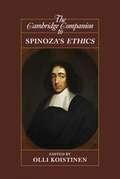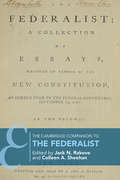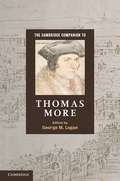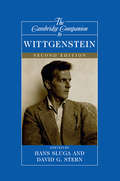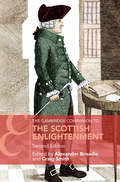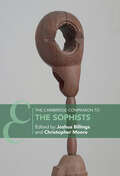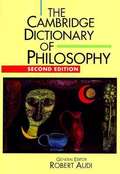- Table View
- List View
The Cambridge Companion to Schopenhauer
by Christopher JanawayArthur Schopenhauer (1788-1860) is something of a maverick figure in the history of philosophy. He produced a unique theory of the world and human existence based upon his notion of will. This collection analyses the related but distinct components of will from the point of view of epistemology, metaphysics, philosophy of mind, aesthetics, ethics, and the philosophy of psychoanalysis. This volume explores Schopenhauer's philosophy of death, his relationship to the philosophy of Kant, his use of ideas drawn from both Buddhism and Hinduism, and the important influence he exerted on Nietzsche, Freud, and Wittgenstein.
The Cambridge Companion to Seneca
by Shadi Bartsch Alessandro SchiesaroThe Roman statesman, philosopher, and playwright Lucius Annaeus Seneca dramatically influenced the progression of Western thought. His works have had an unparalleled impact on the development of ethical theory, shaping a code of behavior for dealing with tyranny in his own age that endures today. This companion thoroughly examines the complete Senecan corpus, with special emphasis on the aspects of his writings that have challenged interpretation. The authors place Seneca in the context of the ancient world and trace his impressive legacy in literature, art, religion, and politics from Neronian Rome to the early modern period. Through critical discussion of the recent proliferation of Senecan studies, this volume compellingly illustrates how the perception of Seneca and his particular type of Stoicism has evolved over time. It provides a comprehensive overview that will benefit students and scholars in classics, comparative literature, history, philosophy, and political theory, as well as general readers.
The Cambridge Companion to Socrates
by Donald R. MorrisonThe Cambridge Companion to Socrates is a collection of essays providing a comprehensive guide to Socrates, the most famous Greek philosopher. Because Socrates himself wrote nothing, our evidence comes from the writings of his friends (above all Plato), his enemies, and later writers. Socrates is thus a literary figure as well as a historical person. Both aspects of Socrates' legacy are covered in this volume. Socrates' character is full of paradox, and so are his philosophical views. These paradoxes have led to deep differences in scholars' interpretations of Socrates and his thought. Mirroring this wide range of thought about Socrates, this volume's contributors are unusually diverse in their background and perspective. The essays in this volume were authored by classical philologists, philosophers and historians from Germany, Francophone Canada, Britain and the United States, and they represent a range of interpretive and philosophical traditions.
The Cambridge Companion to Spinoza
by Don GarrettBenedict (Baruch) de Spinoza has been one of the most inspiring and influential philosophers of the modern era, yet also one of the most difficult and most frequently misunderstood. Spinoza sought to unify mind and body, science and religion, and to derive an ethics of reason, virtue, and freedom 'in geometrical order' from a monistic metaphysics. Of all the philosophical systems of the seventeenth century it is his that speaks most deeply to the twentieth century. The essays in this volume provide a clear and systematic exegesis of Spinoza's thought informed by the most recent scholarship. They cover his metaphysics, epistemology, philosophy of science, psychology, ethics, political theory, theology, and scriptural interpretation, as well as his life and influence on later thinkers.
The Cambridge Companion to Spinoza (Cambridge Companions to Philosophy)
by Don GarrettBenedict (Baruch) de Spinoza (1632–1677) was one of the most systematic, inspiring, and influential philosophers of the early modern period. From a pantheistic starting point that identified God with Nature as all of reality, he sought to demonstrate an ethics of reason, virtue, and freedom while unifying religion with science and mind with body. His contributions to metaphysics, epistemology, psychology, ethics, politics, and the analysis of religion remain vital to the present day. Yet his writings initially appear forbidding to contemporary readers, and his ideas have often been misunderstood. This second edition of The Cambridge Companion to Spinoza includes new chapters on Spinoza's life and his metaphysics, epistemology, philosophy of religion, and biblical scholarship, as well as extensive updates to the previous chapters and bibliography. A thorough, reliable, and accessible guide to this extraordinary philosopher, it will be invaluable to anyone who wants to understand what Spinoza has to teach.
The Cambridge Companion to Spinoza'S Ethics
by Olli KoistinenSince its publication in 1677, Spinoza's Ethics has fascinated philosophers, novelists, and scientists alike. It is undoubtedly one of the most exciting and contested works of Western philosophy. Written in an austere, geometrical fashion, the work teaches us how we should live, ending with an ethics in which the only thing good in itself is understanding. Spinoza argues that only that which hinders us from understanding is bad and shows that those endowed with a human mind should devote themselves, as much as they can, to a contemplative life. This 2009 Companion volume provides a detailed, accessible exposition of the Ethics. Written by an internationally known team of scholars, it is the first anthology to treat the whole of the Ethics and is written in an accessible style.
The Cambridge Companion to The Federalist (Cambridge Companions to Philosophy)
by Jack N. Rakove Colleen A. SheehanThe eighty-five Federalist essays written by Alexander Hamilton, John Jay, and James Madison as 'Publius' to support the ratification of the Constitution in 1787–88 are regarded as the preeminent American contribution to Western political theory. Recently, there have been major developments in scholarship on the Revolutionary and Founding era as well as increased public interest in constitutional matters that make this a propitious moment to reflect on the contributions and complexity of The Federalist. This volume of specially commissioned essays covers the broad scope of 'Publius' work, including historical, political, philosophical, juridical, and moral dimensions. In so doing, they bring the design and arguments of the text into focus for twenty-first century scholars, students, and citizens and show how these diverse treatments of The Federalist are associated with an array of substantive political and constitutional perspectives in our own time.
The Cambridge Companion to Thomas More
by George M. LoganThis Companion offers a comprehensive introduction to the life and work of a major figure of the modern world. Combining breadth of coverage with depth, the book opens with essays on More's family, early life and education, his literary humanism, virtuoso rhetoric, illustrious public career and ferocious opposition to emergent Protestantism, and his fall from power, incarceration, trial and execution. These chapters are followed by in-depth studies of five of More's major works - Utopia, The History of King Richard the Third, A Dialogue Concerning Heresies, A Dialogue of Comfort against Tribulation and De Tristitia Christi - and a final essay on the varied responses to the man and his writings in his own and subsequent centuries. The volume provides an accessible overview of this fascinating figure to students and other interested readers, whilst also presenting, and in many areas extending, the most important modern scholarship on him.
The Cambridge Companion to Thomas Reid
by Terence Cuneo René Van WoudenbergWidely acknowledged as the principal architect of Scottish common sense philosophy, Thomas Reid is increasingly recognized today as one of the finest philosophers of the eighteenth century. Combining a sophisticated response to the skeptical and idealist views of his day, Reid's thought represents an important alternative to Humean skepticism, Kantian idealism and Cartesian rationalism. This work covers not only his philosophy but his scientific research and extensive historical influence.
The Cambridge Companion to Tocqueville
by Cheryl B. WelchThe Cambridge Companion to Tocqueville contains a set of critical interpretive essays by internationally renowned scholars on the work of Alexis de Tocqueville. The essays cover Tocqueville's major themes (liberty, equality, democracy, despotism, civil society, religion) and texts (Democracy in America, Recollections, Old Regime and the Revolution, other important reports, speeches and letters). The authors analyze both Tocqueville's contributions as a theorist of modern democracy and his craft as a writer. Collections of secondary work on Tocqueville have tended to fall into camps, either bringing together only scholars from one point of view or discipline, or treating only one major text. This Companion transgresses national, ideological, disciplinary, and textual boundaries to bring together the best in recent Tocqueville scholarship. The essays not only introduce Tocqueville's major themes and texts, but also put forward provocative arguments that advance the field of Tocqueville studies.
The Cambridge Companion to Utilitarianism
by Dale E. Miller Ben EgglestonUtilitarianism, the approach to ethics based on the maximization of overall well-being, continues to have great traction in moral philosophy and political thought. This Companion offers a systematic exploration of its history, themes, and applications. First, it traces the origins and development of utilitarianism via the work of Jeremy Bentham, John Stuart Mill, Henry Sidgwick, and others. The volume then explores issues in the formulation of utilitarianism, including act versus rule utilitarianism, actual versus expected consequences, and objective versus subjective theories of well-being. Next, utilitarianism is positioned in relation to Kantianism and virtue ethics, and the possibility of conflict between utilitarianism and fairness is considered. Finally, the volume explores the modern relevance of utilitarianism by considering its practical implications for contemporary controversies such as military conflict and global warming. The volume will be an important resource for all those studying moral philosophy, political philosophy, political theory, and history of ideas.
The Cambridge Companion to Virtue Ethics
by Daniel C. RussellVirtue ethics has emerged from a rich history, in which both Aristotle and Aquinas have played an important role, to become one of the fastest-growing fields in contemporary ethics. In this volume of newly commissioned essays, leading moral philosophers offer a comprehensive overview of virtue ethics. They examine the theoretical structure of virtue ethics and its place in contemporary moral theory and other topics discussed include the history of virtue-based approaches to ethics, what makes these approaches distinctive, what they can say about specific practical issues and where we can expect them to go in the future. This Companion will be useful to students of virtue ethics and the history of ethics and to others who want to understand how virtue ethics is changing the face of contemporary moral philosophy.
The Cambridge Companion to W.E.B. Du Bois
by Shamoon ZamirW. E. B. Du Bois was the pre-eminent African American intellectual of the twentieth century. As a pioneering historian, sociologist and civil rights activist, and as a novelist and autobiographer, he made the problem of race central to an understanding of the United States within both national and transnational contexts; his masterwork The Souls of Black Folk (1903) is today among the most widely read and most often quoted works of American literature. This Companion presents ten specially commissioned essays by an international team of scholars which explore key aspects of Du Bois's work. The book offers students a critical introduction to Du Bois, as well as opening new pathways into the further study of his remarkable career. It will be of interest to all those working in African American studies, American literature, and American studies generally.
The Cambridge Companion to William James
by Ruth Anna PutnamWilliam James (1842-1910) was both a philosopher and a psychologist, nowadays most closely associated with the pragmatic theory of truth. The essays in this Companion deal with the full range of his thought, including technical philosophical issues, religious speculation, moral philosophy and political controversies of his time. New readers and nonspecialists will find this the most convenient and accessible guide to James currently available. Advanced students and specialists will find a conspectus of recent developments in the interpretation of James.
The Cambridge Companion to Wittgenstein (Cambridge Companions to Philosophy)
by Hans Sluga David G. SternLudwig Wittgenstein (1889–1951) is one of the most important and influential philosophers in modern times, but he is also one of the least accessible. In this volume, leading experts chart the development of his work and clarify the connections between its different stages. The essays, which are both expository and original, address central themes in Wittgenstein's writing on a wide range of topics, particularly his thinking about the mind, language, logic, and mathematics. The contributors illuminate the character of the whole body of work by focusing on key topics: the style of the philosophy, the conception of grammar contained in it, rule-following, convention, logical necessity, the self, and what Wittgenstein called, in a famous phrase, 'forms of life'. This revised edition includes a new introduction, five new essays - on Tractarian ethics, Wittgenstein's development, aspects, the mind, and time and history - and a fully updated comprehensive bibliography. An updated edition of this accessible and wide-ranging volume, charting the work of one of the most important philosophers of modern times Includes five entirely new chapters on the mind, time and history, Tractarian ethics, aspects, and Wittgenstein's development. Contains a new introduction which sets Wittgenstein and his thinking in its twentieth-century context, and a fully updated bibliography to reflect advances in recent scholarship.
The Cambridge Companion to the Bloomsbury Group
by Victoria RosnerNamed after a small neighborhood in London where its members settled as young adults, the Bloomsbury Group produced an impressive body of work that yielded British Post-Impressionist painting, literary modernism, the field of macroeconomics, and a new direction for public taste in art. This Companion offers a comprehensive guide to the intellectual and social contexts surrounding Bloomsbury and its coterie, which includes writer Virginia Woolf, economist Maynard Keynes, and art critic Roger Fry, among others. Thirteen chapters from leading scholars and critics explore the Bloomsbury Group's rejection of Victorian values and social mores, their interventions in issues of empire and international politics, their innovations in the literary and visual arts, and more. Complete with a chronology of key events and a detailed guide to further reading, this Companion provides scholars and students of English literature with fresh perspectives on the achievements of this remarkable circle of friends.
The Cambridge Companion to the French Enlightenment
by Daniel BrewerThe Enlightenment has long been seen as synonymous with the beginnings of modern Western intellectual and political culture. As a set of ideas and a social movement, this historical moment, the 'age of reason' of the seventeenth and eighteenth century, is marked by attempts to place knowledge on new foundations. The Cambridge Companion to the French Enlightenment brings together essays by leading scholars representing disciplines ranging from philosophy, religion and literature, to art, medicine, anthropology and architecture, to analyse the French Enlightenment. Each essay presents a concise view of an important aspect of the French Enlightenment, discussing its defining characteristics, internal dynamics and historical transformations. The Companion discusses the most influential reinterpretations of the Enlightenment that have taken place during the last two decades, reinterpretations that both reflect and have contributed to important re-evaluations of received ideas about the Enlightenment and the early modern period more generally.
The Cambridge Companion to the Modern Gothic
by Jerrold E. HogleThis Companion explores the many ways in which the Gothic has dispersed in the twentieth and twenty-first centuries, and in particular how it has come to offer a focus for the tensions inherent in modernity. Fourteen essays by world-class experts show how the Gothic in numerous forms - including literature, film, television, and cyberspace - helps audiences both to distance themselves from and to deal with some of the key underlying problems of modern life. Topics discussed include the norms and shifting boundaries of sex and gender, the explosion of different forms of media and technology, the mixture of cultures across the western world, the problem of identity for the modern individual, what people continue to see as evil, and the very nature of modernity. Also including a chronology and guide to further reading, this volume offers a comprehensive account of the importance of Gothic to modern life and thought.
The Cambridge Companion to the Scottish Enlightenment
by Alexander BroadieA distinguished team of contributors examines the writings of David Hume, Adam Smith, Thomas Reid, Adam Ferguson, Colin Maclaurin and other Scottish thinkers, in philosophy, natural theology, economics, anthropology, natural science and law. The contributors also relate the Scottish Enlightenment to its historical context and assess its impact and legacy in Europe, America and beyond. The volume is of interest to a wide range of readers in philosophy, theology, literature and the history of ideas.
The Cambridge Companion to the Scottish Enlightenment (Cambridge Companions to Philosophy)
by Craig Smith Alexander BroadieThe second edition of this Companion presents a philosophical perspective on an eighteenth-century phenomenon that has had a profound influence on Western culture. A distinguished team of contributors examines the writings of David Hume, Adam Smith, Thomas Reid, Adam Ferguson and other Scottish thinkers. Their subjects range across philosophy, natural theology, economics, anthropology, natural science, and law and the arts, and in addition, they relate the Scottish Enlightenment to its historical context and assess its impact and legacy. The result is a comprehensive and accessible volume that illuminates the richness, the intellectual variety and the underlying unity of this important movement. This volume contains five entirely new chapters on morality, the human mind, aesthetics, sentimentalism and political economy, and eleven other chapters have been significantly revised and updated. The book will be of interest to a wide range of readers in philosophy, theology, literature and the history of ideas.
The Cambridge Companion to the Sophists (Cambridge Companions to Philosophy)
by Christopher Moore Joshua BillingsThe Classical Greek sophists – Protagoras, Gorgias, Prodicus, Hippias, and Antiphon, among others – are some of the most important figures in the flourishing of linguistic, historical, and philosophical reflection at the time of Socrates. They are also some of the most controversial: what makes the sophists distinctive, and what they contributed to fifth-century intellectual culture, has been hotly debated since the time of Plato. They have often been derided as reactionaries, relativists or cynically superficial thinkers, or as mere opportunists, making money from wealthy democrats eager for public repute. This volume takes a fresh perspective on the sophists – who really counted as one; how distinctive they were; and what kind of sense later thinkers made of them. In three sections, contributors address the sophists' predecessors and historical and professional context; their major intellectual themes, including language, ethics, society, and religion; and their reception from the fourth century BCE to modernity.
The Cambridge Companion to the Stoics
by Brad InwoodThis unique volume offers an odyssey through the ideas of the Stoics in three particular ways: first, through the historical trajectory of the school itself and its influence; second, through the recovery of the history of Stoic thought; third, through the ongoing confrontation with Stoicism, showing how it refines philosophical traditions, challenges the imagination, and ultimately defines the kind of life one chooses to lead. A distinguished roster of specialists have written an authoritative guide to the entire philosophical tradition. The first two chapters chart the history of the school in the ancient world, and are followed by chapters on the core themes of the Stoic system: epistemology, logic, natural philosophy, theology, determinism, and metaphysics. There are two chapters on what might be thought of as the heart and soul of the Stoics system: ethics.
The Cambridge Dictionary of Philosophy
by Robert Audi Paul AudiThis is the most authoritative and comprehensive one-volume dictionary of philosophy available in English. It contains over 4,000 entries, which range in length from 100 to 4,000 words. The Dictionary has been written by an international team of over 350 experts, so, rather than offering the limited perspective of a single writer, it distils the collective knowledge of the professional community of philosophers in an accessible manner. The Cambridge Dictionary clearly and concisely defines both technical terms and crucial concepts, and will promote the understanding of philosophy on all levels and across all fields. It includes substantial explanatory articles on all major philosophers as well as hundreds of minor figures. There are expansive, up-to-date overviews of all the important sub-disciplines such as ethics, epistemology, metaphysics, philosophy of mind and logic. No other reference work on philosophy contains so many entries on related subjects such as cognitive science, linguistics, theology, law, history of science and literature.
The Cambridge Dictionary of Philosophy
by Robert AudiThis is the most authoritative and comprehensive one-volume dictionary of philosophy available in English. It contains over 4,000 entries, which range in length from 100 to 4,000 words. The Dictionary has been written by an international team of over 350 experts, so, rather than offering the limited perspective of a single writer, it distils the collective knowledge of the professional community of philosophers in an accessible manner. The Cambridge Dictionary clearly and concisely defines both technical terms and crucial concepts, and will promote the understanding of philosophy on all levels and across all fields. It includes substantial explanatory articles on all major philosophers as well as hundreds of minor figures. There are expansive, up-to-date overviews of all the important sub-disciplines such as ethics, epistemology, metaphysics, philosophy of mind and logic. No other reference work on philosophy contains so many entries on related subjects such as cognitive science, linguistics, theology, law, history of science and literature.
The Cambridge Dictionary of Philosophy (2nd edition)
by Robert AudiThis new edition of a one-volume dictionary of philosophy features expansions in standing entries and the addition of some 400 new ones across the entire range of the subject, including selective coverage of a number of living philosophers. It covers not only Western and European philosophy, but also African, Arabic, Islamic, Japanese, Jewish, Korean, and Latin-American. In addition to major philosophers, entries include rapidly developing fields such as the philosophy of mind and applied ethics (bioethics, environmental, medical and professional). Audi is Charles J. Mach Distinguished Professor of Philosophy, U. of Nebraska at Lincoln.


